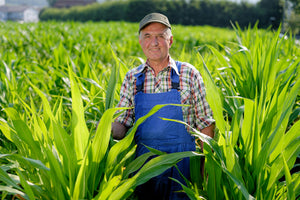If Probiotics are so Good for us, Can They Benefit Plants too?
March 19, 2018

It’s well established at this point that beneficial bacteria, or probiotics, are good for humans and animals. Can these beneficial bacteria be good for plants too?
Researchers think so. Scientists discover new human health benefits imparted by probiotics every day. Now they think probiotics can benefit plants. In fact, supplementing plants with probiotics may even help feed the world someday.
Global population will reach 9.7 billion by 2050, according to the United Nations. Feeding all those hungry mouths will be a tremendous undertaking in the future, considering 795 million people do not have enough food to lead a healthy, active life today. Current methods of feeding the world’s population are inadequate, and leave little room for success in feeding millions more in thirty years.
To meet the nutritional needs of the future, we will need to increase food production by at least 70 percent, according to the Food and Agriculture Organization of the United Nations; the production of both cereal and meat production will have to rise dramatically. Plant production must increase to meet increased demand for cereal and as feed for meat production. Shortages of arable land, water and genetic diversity, coupled with climate change, will certainly challenge efforts to increase food production.
Clearly, feeding the world will take big ideas. It may also require tiny microbes.
The Benefits of Probiotics for Man and Beast
Medical scientists have known for years about many of the effects probiotics have on human health. Health professionals know that these beneficial bacteria can improve digestion and immune health. Probiotics can also keep the human heart healthy and improve mood. Research suggests probiotics can improve our ability to handle stress and ward off disease. Probiotics can even provide health benefits for dogs, cats and horses.
But can “good bacteria” benefit plants?
Many think so. One company, Indigo Agriculture, plans to use beneficial microbes to help crops grow faster, stronger, and more productively. They hope that the use of probiotics can make crops grow better in the fields today, and help crops survive and even thrive in the future. Of course, these probiotics are different from human probiotics, but the principles remains the same.
Probiotics for Plants
Our ever-changing world destabilizes the ecosystem of bacteria living in the human body, known as the microbiome. Over-use of antibiotics has systematically reduced the population and diversity of both bad and good bacteria living in the gut, and a diet filled with processed foods helps the number of pathogenic bacteria overwhelm the number of beneficial bacteria.
Much the same can be said for plants. Modern agricultural practices include widespread use of agricultural chemicals and fungicides killed disease-causing bacteria. While these treatments helped reduce harmful microbes, they also decimated beneficial microbes.
As they do in humans, beneficial bacteria can help plants withstand drought and other environmental stresses. These microbes can also help plants grow more productively by trapping important nutrients, such as nitrogen. Bacteria in the soil and on plants help “fix” nitrogen to give plants better access to the nutrient.
Research also shows that entire communities of these bacteria help poplar and willow trees grow tall and strong in rocky, nutrient-poor soil. The scientist in that study was even able to transfer the nitrogen-fixing bacteria to another plant; crops receiving the transferred microbes grew taller and had fuller root systems.
Researchers from Indigo spent years sequencing 40,000 plant microbes and identifying the beneficial microbes that live in each plant. The scientists then coated the plant seeds with the corresponding probiotics before planting the seeds in the ground. The microbes helped the plants grow with less water, in warmer climates, and even in saltier soils. This is exciting news, given the fact that agriculture currently uses about 70 percent of the global water supply in a world where water consumption is already dangerously high. If we continue our current water management practices, agriculture will need to double its water consumption to feed the world.
More research is needed into the benefits of probiotic supplementation for plants, of course, but the use of beneficial bacteria may someday help us feed our ever-expanding population.
The post If Probiotics are so Good for us, Can They Benefit Plants too? appeared first on Natren Probiotics Blog.





Leave a comment